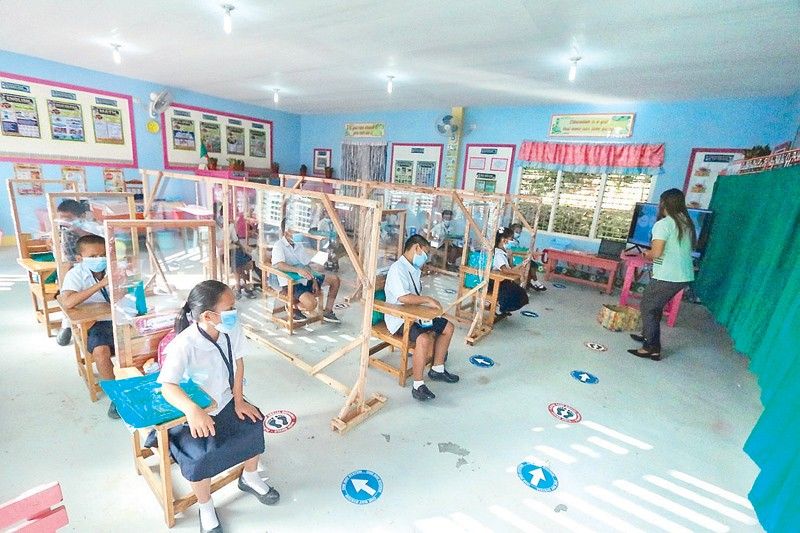DepEd’s use of mother tongue in multilingual settings an ‘experiment’ – senator

MANILA, Philippines — The lack of an in-depth study on the use of mother tongue-based education to improve learning outcomes, especially in linguistically diverse settings, has led Sen. Sherwin Gatchalian to describe the Philippines as the “de facto” experiment for the language program.
This comes after the Senate basic education committee, which Gatchalian chairs, conducted four oversight hearings on the controversial Department of Education (DepEd) policy requiring the use of the mother tongue — the first language learned at home — in teaching.
Gatchalian quizzed DepEd whether a study on mother tongue-based education was conducted before it was institutionalized through Republic Act No. 10533 or the K to 12 Law.
A representative of DepEd explained that they had only conducted studies in homogeneous or monolinguistic settings — or where students only communicate in the same language.
"When I asked about the implementation strategy on a multilingual setting, we do not have that also. So, we became the de facto experiment for mother tongue in a multilingual setting. And that experiment is now creating a lot of confusion and negative feedback from our teachers," Gatchalian said.
Gatchalian also said during the July 3 hearing that there “seems to (be) no intentional effort to analyze learning outcomes” in relation to mother-tongue-based education.
The Senate inquiry into the mother-tongue-based multilingual education follows the House of Representatives' passage of a bill that suspends its use from Kinder to Grade 3 to give the government time to produce materials in these languages.
The mother tongue is currently taught as a subject from Grades 1 to 3 and is also used as a medium of instruction.
Pushback against the mother tongue policy has so far focused on the lack of teaching materials and teachers’ confusion over what language to use for students who speak different languages in some regions.
‘Linguistically diverse’ CAR as example
During the July 3 hearing, Gatchalian cited as an example the situation of schools in the Cordillera Administrative Region, which conducted its own assessment in the school year 2022-2023 and found that students had better reading comprehension in Filipino and English than their mother tongue.
DepEd CAR also said during the hearing that students “whose first languages were English and Filipino performed better in reading comprehension” compared to those who speak other languages as their mother tongue.
In terms of implementation, DepEd CAR has also found a "mismatch between the child's mother tongue and the language used in the classroom," wherein some students already understand the English term so they could no longer "understand the terms in mother tongue when presented."
A representative of DepEd CAR said this has led some parents to enroll their students in private schools for grades 1 to 3 to skirt the mother tongue policy, after which they would transfer them back to public schools.
“That implies they believe it would be better for children to be taught in English and Filipino,” the DepEd CAR representative said.
Mother tongue as students’ ‘common language,’ not parents’ language
Rosalina Villaneza, chief education program specialist of the DepEd-Bureau of Learning Delivery acknowledged that there is a real "mismatch" between those implementing mother-tongue-based education and the concept of the program as understood by international education experts.
The “mismatch” sometimes takes place when regional offices base the mother tongue on the language of the children’s parents and not the language they understand best.
“Language is dynamic. If they use the language they are familiar with, the comprehension will be faster,” Villaneza said.
The DepEd exec added that some linguists helping develop language materials tend to be a stickler for language rules that some children do not use when speaking the language.
The use of mother tongue in the classroom should be to help students "develop cognitive and reasoning skills," Villaneza clarified, and preserving the languages is not the top priority.
"We don't intend to create linguists among K to 3 learners," she added.
Implementation issues
In a Senate hearing in 2022, DepEd bared that only 78,872 of its targeted 305,099 educators have been trained for the use of the mother tongue as a medium of instruction.
State think tank Philippine Institute of Development Studies also found in a study that less than 10% of over 16,000 schools it analyzed had fully complied with the main aspects of the MTB-MLE implementation, namely in orthography, grammar, learning resources, and dictionary.
The Senate panel did not recommend any specific action — such as whether to scrap or pause the implementation of the mother-tongue-based education. Instead, Gatchalian has ordered DepEd to come up with a strategic plan to improve its implementation.
"We know that implementation is not a simple department order. We need to come up with a strategic plan to make it strategic in terms of implementation,” the senator said.
“We need to know if this can be implemented or not," he added.
- Latest
- Trending































